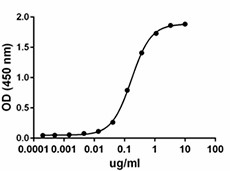- Regulatory Status
- RUO
- Other Names
- CD274, Programmed cell death 1 ligand 1 (PD-L1), B7 homolog 1 (B7h1)

-

Immobilized mouse PD-L1 binds mouse PD-1 in a dose dependent manner.
| Cat # | Size | Price | Quantity Check Availability | ||
|---|---|---|---|---|---|
| 758202 | 10 µg | $54.00 | |||
| 758204 | 25 µg | $112.00 | |||
| 758206 | 100 µg | $229.00 | |||
| 758208 | 500 µg | $703.00 | |||
PD-L1 is a type I transmembrane protein of 290 amino acids, and it is a member of the B7 family. Mouse PD-L1 has 70% amino acid identity to its human orthologue. Binding of PD-L1 to its receptor PD-1 leads to the inhibition of T cell receptor–mediated lymphocyte proliferation and cytokine secretion. PD-L1 induces IL-10 production in T cells stimulated with low levels of anti-CD3. PD-L1/PD-1 interaction suppresses immune responses against autoantigens and tumors and plays an important role in the maintenance of peripheral immune tolerance. Disruption of the PD-L1 gene leads to up-regulated T cell responses and the generation of self-reactive T cells. Antibodies against PD-1 or PD-L1 leads to increased antitumor immunity. PDL1 has an important role in conferring fetomaternal tolerance in an allogeneic pregnancy model; antibodies against PD-L1 lead to a breakdown in maternal tolerance to the fetus. PD-L1 shares its receptor with PD-L2 (CD273, B7-DC). PD-L2 has a more limited expression than PD-L1, being expressed on activated macrophages and dendritic cells. PD-L1 is expressed in many tumors, and the interaction with its receptor activates signaling pathways that inhibit T-cell activity and therefore the antitumor immune response. Antibodies targeting PD1 or PD-L1 block the PD1 pathway and reactivate T cell activity.
Product Details
- Source
- Mouse B7-H1, amino acids (Phe19-Thr238) (Accession# NM_021893), was expressed in 293E cells. Human IgG-Fc is in the carboxy-terminus.
- Molecular Mass
- The 458 amino acid recombinant protein has a predicted molecular mass of approximately 51.5kD. The DTT-reduced and non-reduced protein migrate at approximately 70 - 80kD and 140kD respectively by SDS-PAGE. The predicted N-terminal amino acid is Phe.
- Purity
- >95%, as determined by Coomassie stained SDS-PAGE.
- Formulation
- 0.22 µm filtered protein solution is in PBS, pH 7.2.
- Endotoxin Level
- Less than 0.1 EU per µg of protein as determined by the LAL method.
- Concentration
- 10 and 25 µg sizes are bottled at 200 µg/mL. 100 µg size and larger sizes are lot-specific and bottled at the concentration indicated on the vial. To obtain lot-specific concentration and expiration, please enter the lot number in our Certificate of Analysis online tool.
- Storage & Handling
- Unopened vial can be stored between 2°C and 8°C for up to 2 weeks, at -20°C for up to six months, or at -70°C or colder until the expiration date. For maximum results, quick spin vial prior to opening. The protein can be aliquoted and stored at -20°C or colder. Stock solutions can also be prepared at 50 - 100 µg/mL in appropriate sterile buffer, carrier protein such as 0.2 - 1% BSA or HSA can be added when preparing the stock solution. Aliquots can be stored between 2°C and 8°C for up to one week and stored at -20°C or colder for up to 3 months. Avoid repeated freeze/thaw cycles.
- Activity
- Immobilized mouse PD-L1 binds mouse PD-1 in a dose dependent manner. The ED50 = 0.1 - 0.5 µg/ml.
- Recommended Usage
-
Bioassay
- Application Notes
-
BioLegend carrier-free recombinant proteins provided in liquid format are shipped on blue-ice. Our comparison testing data indicates that when handled and stored as recommended, the liquid format has equal or better stability and shelf-life compared to commercially available lyophilized proteins after reconstitution. Our liquid proteins are verified in-house to maintain activity after shipping on blue ice and are backed by our 100% satisfaction guarantee. If you have any concerns, contact us at tech@biolegend.com.
- Product Citations
-
Antigen Details
- Structure
- Dimer.
- Distribution
- APC, monocytes, dendritic cells, expressed in nonlymphoid tissues, and stromal cell.
- Function
- Enhances CD28-independent T-helper cell function, suppresses immune responses against autoantigens, and participates in fetomaternal tolerance.
- Interaction
- Antigen-stimulated T and B cells, regulatory T cells, follicular T and B cells, dendritic cells, and monocytes.
- Ligand/Receptor
- PD-1 (CD279).
- Bioactivity
- Immobilized mouse PD-L1 binds to its receptor PD-1.
- Cell Type
- Embryonic Stem Cells
- Biology Area
- Immunology, Cancer Biomarkers, Costimulatory Molecules, Stem Cells
- Molecular Family
- Adhesion Molecules, CD Molecules, Immune Checkpoint Receptors, Soluble Receptors
- Antigen References
-
1. Dong H, et al. 1999. Nat. Med. 5:1365.
2. Freeman GJ, et al. 2000. J. Exp. Med. 192:1027.
3. Latchman Y, et al. 2001. Nat. Immunol. 2:261.
4. Latchman YE, et al. 2004. Proc. Natl. Acad. Sci. USA 101:10691.
5. Guleria I, et al. 2005. J. Exp. Med. 202:231.
6. Lin DY, et al. 2008. Proc. Natl. Acad. Sci. USA 105:3011.
7. Dai S, et al. 2014. Cell Immunol. 290:72.
8. Melero I, et al. 2015. Nat. Rev. Cancer 15:457. - Gene ID
- 60533 View all products for this Gene ID
- UniProt
- View information about B7-H1 on UniProt.org
